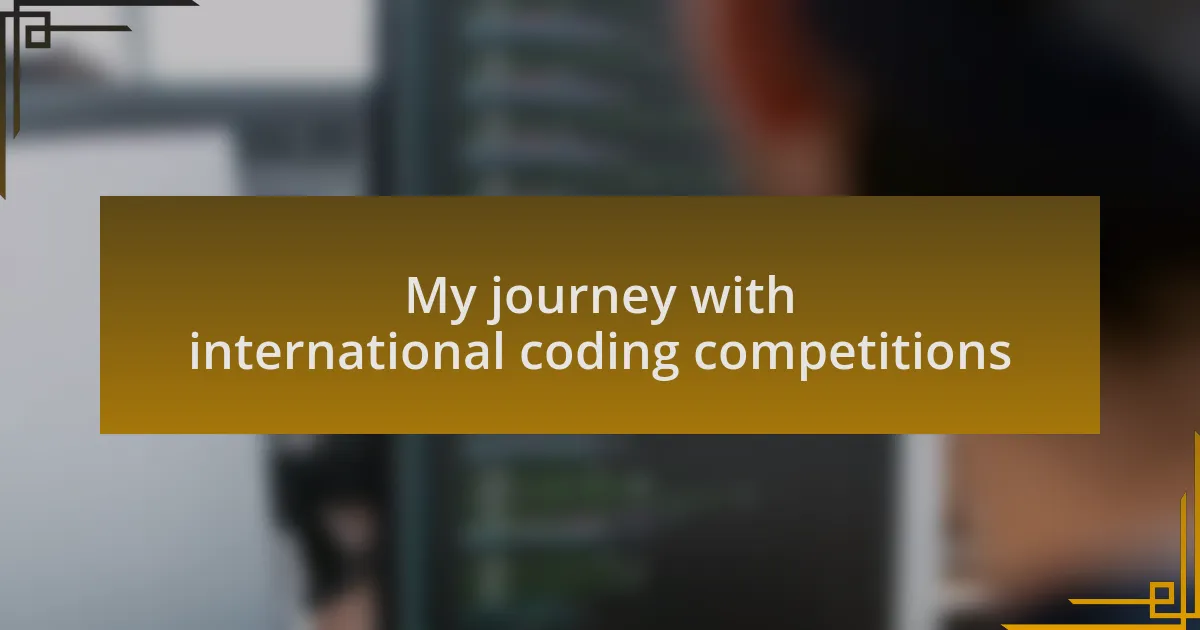Key takeaways:
- International coding competitions foster creativity and collaboration among diverse programmers while presenting unique challenges.
- Effective preparation involves strategic planning, problem-solving techniques, and engaging in mock competitions to build confidence.
- Essential skills for competitive programming include algorithmic thinking, understanding data structures, and analyzing time complexity for efficient coding solutions.
Author: Liam Harrington
Bio: Liam Harrington is an acclaimed author known for his captivating blend of literary fiction and psychological thriller. Born and raised in the Pacific Northwest, he draws inspiration from the region’s lush landscapes and intricate human connections. With a degree in English Literature from the University of Washington, Liam has published several bestselling novels, earning accolades for his intricate plots and rich character development. When he’s not writing, he enjoys exploring the outdoors and uncovering hidden stories in everyday life. Liam currently resides in Seattle with his partner and their two spirited dogs.
Understanding international coding competitions
International coding competitions are a unique platform that brings together programmers from diverse backgrounds to solve complex problems under time constraints. I remember my first competition vividly; the adrenaline rush as the clock ticked down, mixed with that exhilarating feeling of connecting with participants from all over the globe. Have you ever felt that blend of excitement and nervousness? It can truly be a transformative experience.
The variety of challenges presented in these competitions makes them not just a test of skill but also a way to foster creativity and innovative thinking. I’ve often found myself approaching problems from new angles during these events, which has been beneficial in my coding projects. Doesn’t it make you wonder how stepping out of your comfort zone can unlock new levels of understanding?
Participating in international coding competitions also encourages collaboration, even in competitive settings. I recall teaming up with a coder from another country; we tackled problems together, blending our unique perspectives and methods. It was a reminder that despite our differences, a shared passion for coding unites us. Have you ever experienced that camaraderie in unexpected places? It enriches not just our knowledge but also our global community.
Preparing for coding competitions
Preparing for coding competitions requires a blend of strategic planning and mental fortitude. I remember when I prepped for my first international contest; I set a schedule that balanced practicing different coding languages with taking breaks to avoid burnout. Have you ever felt overwhelmed by the sheer volume of material? It’s essential to find that balance to keep your mind sharp and motivated.
Diving deep into problem-solving techniques is crucial. I found that revisiting past competition questions helped me recognize patterns and formulate better strategies. One time, I spent an entire weekend tackling problems that baffled me at first but, in the end, sparked brilliant solutions. It makes you question—how often do you push yourself beyond initial frustration to find clarity?
Another vital aspect of preparation is engaging in mock competitions. I vividly recall participating in a local contest, which simulated the pressure of an international stage. The experience was nerve-wracking, but it taught me to manage my time wisely and tackle problems systematically. Don’t you think that real-time practice is the best way to build confidence? It makes all the difference when the stakes are high.
Essential skills for competitive programming
Essential skills for competitive programming
One of the essential skills in competitive programming is algorithmic thinking. I remember when I first learned about the various algorithms, like sorting and searching techniques. It was like discovering a new language—suddenly, the ability to approach problems efficiently clicked into place. Have you ever experienced that moment when everything just makes sense? It’s exhilarating, isn’t it?
Data structures are another cornerstone of competitive programming. I recall pulling an all-nighter trying to grasp trees and graphs. Once I finally internalized these concepts, I found my performance in competitions soared. It’s fascinating how understanding the right data structure can transform a perplexing problem into a manageable one. Wouldn’t you agree that knowing when to apply each structure is part of what makes you a better coder?
Time complexity analysis is equally crucial. In my earlier competitions, I often underestimated how crucial it was to assess my solutions’ efficiency. There was a moment where I optimized my code, reducing its complexity from quadratic to linear, and that realization was both rewarding and empowering. Have you felt that rush when you see your solution execute faster than you thought possible? It’s that kind of understanding that turns a good programmer into a great one.
